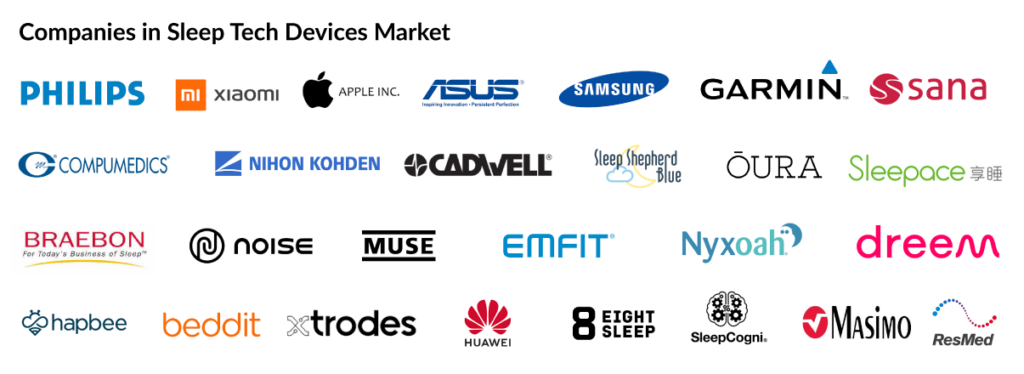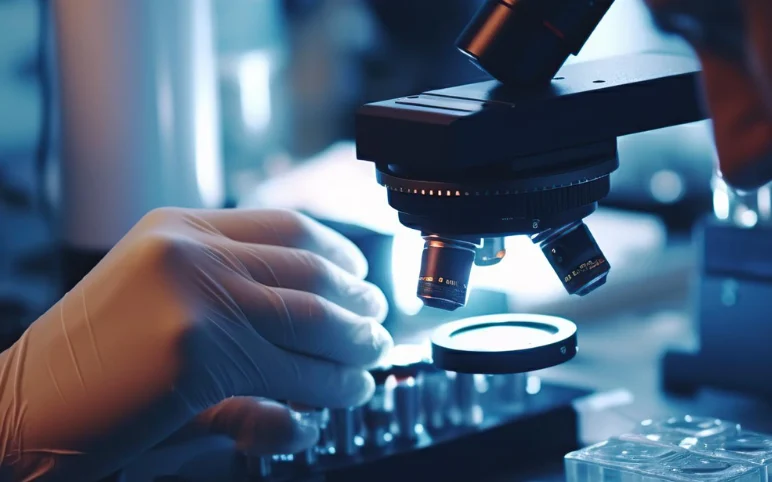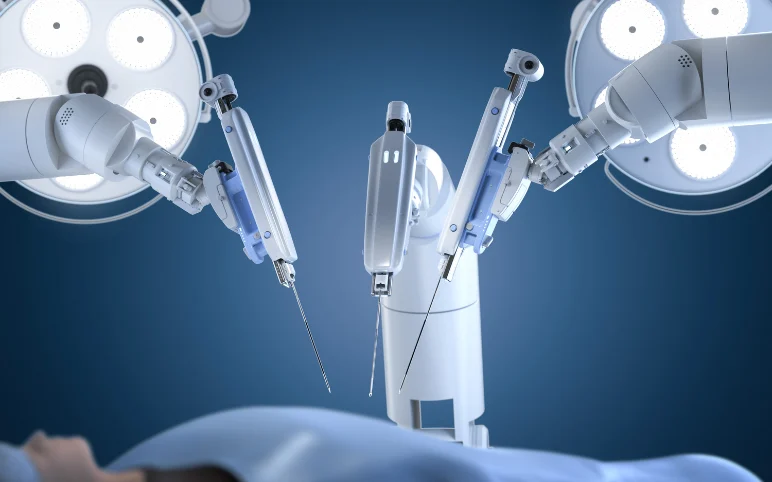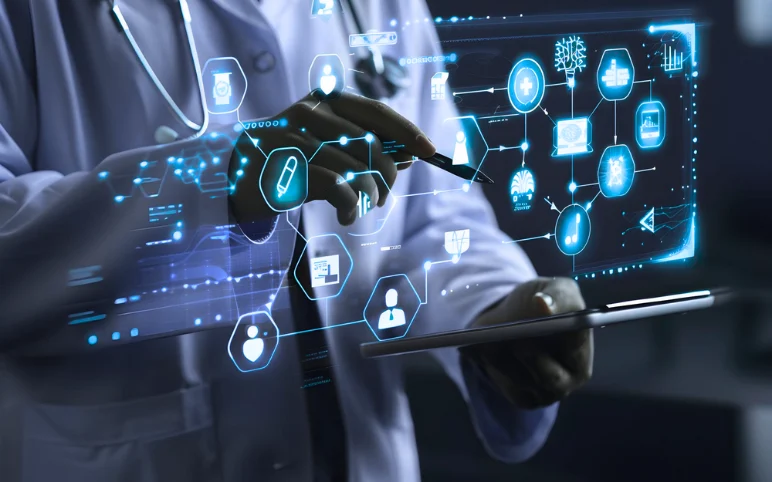How is Technology Addressing the Sleeping Disorders?
Nov 23, 2022
Table of Contents
Sleep disorders (or sleep-wake disorders) are one of the major health burdens in today’s time. Sleep is a fundamental process in human life and well-being, and these disorders largely remain untreated or, more often, misdiagnosed as psychiatric problems. Sleep disorders affect and change the way that a person sleeps. Sleep restores the body, improves energy levels and refreshes the mind. It has a direct correlation with an individual’s mood and mental health. However, sleep disorders are continuously rising due to several underlying factors. It can have several adverse effects on overall health, safety and quality of life. If ignored for long, inadequate sleep or sleep disturbance can increase the risk of developing other health complications, including daytime distress, fatigue, irritability, procrastination, forgetfulness, inattention, irritability and other impairment. Chronic sleep problems or sleep loss can also lead to health conditions such as anxiety, depression, Alzheimer’s disease, dementia, hypertension, and type 2 diabetes.
Sleep disorders can be treated depending on the particular condition. Some of the disorders can be easily managed with the use of conventional medications and cognitive behavioural therapy. Over the past few, several advancements have been registered in the sleep disorders therapeutics market. Pharma and biotech companies are actively working in the segment to provide a better treatment option to address different sleep disorders. Similarly, technological innovation and advances have been registered in the products and gadgets segment, such as smartwatches, fitness trackers, and other consumer wearables. These high-end sophisticated products are equipped with sensor technologies to analyze, diagnose, or treat sleep disorders. Moreover, intense development has been registered in sleep apps, online programs, and supportive & wellness coaches to improve sleep patterns and quality. Globally, millions of people suffering from different sleep disorders have accepted these new and innovative sleep technology devices.
Downloads
Click Here To Get the Article in PDF
Recent Articles
- Beta Bionics Introduces iLet Bionic Pancreas with Abbott’s FreeStyle Libre 3 Integration; Merit M...
- Boston Scientific’s WATCHMAN FLX™ Pro; Quest Diagnostics’s AAV Test; Vitestro Started A.D.O.P.T. ...
- Assessing the Emerging Trends in the Evolving Implantable Drug Delivery Device Landscape
- From Paper to Pixels: The Advantages and Challenges of Electronic Health Record
- Medtronic Secures FDA Approval for First-Ever Adaptive Deep Brain Stimulation System for Parkinso...
How Big is the Burden of Sleep Disorders?
Sleep disorders are a group of medical conditions that affect sleep patterns, and there are more than 90 distinct sleep disorders. The quality, timing, and good amount of sleep are necessary to concentrate on the task and live a healthy life. It is observed that sleep disorders increase the risk of morbidity as well as mortality. Moreover, they have considerable economic costs associated with them. It is also directly related to decreased work productivity, cognitive function, and the decision-making process of the person, which can lead to severe economic consequences. Similarly, in children, it can lead to low academic performance and hampers growth in professional life.
Globally, some of the key factors, such as the change in lifestyle, unbalanced diet, decreased physical activity, and excessive electronic media use, are directly affecting the quantity and quality of sleep. It is observed that sleep problems are underdiagnosed or underreported in most cases. Recently, the Coronavirus disease 2019 (COVID-19) pandemic has also adversely affected sleep patterns among populations. As per the study by Benjafield AV et al. (2019), nearly 1 billion of the world’s population of 7.3 billion people between the ages of 30 and 69 years are estimated to have the most common type of sleep-disorder breathing and obstructive sleep apnoea (OSA). As per the estimate, in the United States, about 50 to 70 million people chronically suffer from a disorder of sleep and wakefulness, reporting symptoms of daytime sleepiness, insomnia, abnormal events during sleep, or irregular sleep schedules. The overall prevalence of sleep disorders in the general population ranges from 20–41.7%. Insomnia and sleep apnea are the most commonly diagnosed sleep disorders in the US. Sleep-Wake Disorders, Narcolepsy, Hypersomnia, Restless Legs Syndrome, and REM Sleep Behavior Disorder are among other major disorders.
Technology in Sleeping Disorders Market
To improve sleep quality, prescription sleep aids are most commonly used by people. Similarly, devices and technologies are also getting significant attention among people. The devices are equipped with sensor technology that can detect a person’s sleep and are intended to improve sleep patterns, quality and overall health. Sleep Tech Devices use various parameters such as heart rate, breathing rhythm, movement, sleep stages, snoring, and the sleeping environment, as well as noise level and light for better sleep management. The data and the information from these devices yield insights that can be used to better understand sleep and find ways to counter sleep loss. Sleep Tech Devices can address various sleep disorders such as Obstructive Sleep Apnea, Central Sleep Apnea, Insomnia, Narcolepsy, and others.
Sleep Tech Devices are segmented into wearable and non-wearable devices as per the product type. Smartwatches, fitness trackers, rings, and bands are some of the most commonly used wearable sleep tech devices. The demand for non-wearable sleep tech devices such as mattresses and sheets is growing due to their various associated benefits. Wearable devices are easy to use and are lighter. Similarly, these devices are portable, user-friendly, and comfortable for all age groups of people to use and operate. These wearable devices can easily integrate with smartphones and other gadgets or work independently. These devices record a wide range of data related to breathing patterns, pulse, and oxygen levels during sleep to provide the most accurate assessment of sleep patterns over time. The user can track their sleep and exchange data with their doctor for accurate diagnosis. These devices can be monitored remotely as well.
Leading Technologies and Devices for Sleeping Disorders
Globally, some of the leading companies are actively working on various sleep tech devices. Some of the leading devices in the market include:
Beddit Sleep Monitor is a non-wearable sleep tracker made up of extremely thin, flat & soft material. Beddit is equipped with Sensors and can be connected to a smartphone. It can be used for various purposes, such as getting detailed analyses of sleep patterns and diagnosing sleep disorders. Moreover, it can help the user to maintain sleep efficiency. Similarly, Sana Health Inc. has developed the Sana device, a wearable sleep inducer for individuals. Sana is a portable, easy-to-use smart sleeping mask that helps manage sleeping and neurological disorders. It measures and collects sleep and health data, which can be analyzed to provide tailored programs for enhanced rest and relaxation. It can improve sleep and reduce feelings of stress and fatigue.
Nyxoah, a Belgium-based medical technology company, has developed the Genio® system, a validated, user-centred, next-generation neurostimulation therapy for Obstructive Sleep Apnea (OSA). Genio® is an easy-to-use, comfortable and efficient sleep apnea treatment that allows users to sleep restfully. Its system consists of an implant and disposable patch that stimulates the tongue’s nerves to make it move, preventing airway obstruction. In June 2022, Noise, a smartwatch brand, launched colorfit pulse buzz smartwatch, a device that helps to monitor heart rate, SpO2 for blood oxygen level tracking, female cycle tracking, and sleep monitoring. Mobile apps have also generated huge demand for better tracking of sleep time, respiratory rate, heart rate, sleep cycles, and body movement. Furthermore, companies are now working to implement Artificial intelligence (AI)-enabled smart solutions in devices to measure the brain’s electrical activity, monitor users’ sleep quality and deliver a better solution.
Key Factors Driving the Demand for Sleep Tech Devices
The rising geriatric population is one of the main drivers of the sleep tech devices demand. As per WHO (in 2021), it was estimated that between the years 2015-2050, the number of individuals aged 60 and more will double from 12-22% and will reach 2.1 billion by the year 2050. By 2030, one out of every six people in the world will age 60 years or beyond. Age increases the chances of suffering from sleep disorders, such as Obstructive Sleep Apnea (OSA), Periodic Limb Movements in Sleep (PLMS), and others. The rise in the geriatric population and the growth in the prevalence of sleeping disorders are expected to drive sleep tech devices demand in the coming years.
Major MedTech and HealthTech Companies in the Sleep Tech Devices Market
To overcome the unmet needs and to provide a better option, globally, some of the leading companies such as Koninklijke Philips N.V, Huawei Device Co Ltd, ResMed, Xiaomi, Apple Inc, ASUSTeK Computer Inc, SAMSUNG, Masimo, Garmin Ltd, Compumedics Limited, NIHON KOHDEN CORPORATION, Cadwell Industries Inc, Eight Sleep, Emfit Ltd, Ōura Health, Sleep Shepherd LLC, Sleepace, Apollo Neuroscience Inc, Braebon Medical Corporation, and among others, are actively working in the sleep tech devices market.

Similarly, several startups have also emerged as key players in the sleep tech devices market over the past few years. These companies provide unique solutions to address various needs and grab market share. Some of the leading Wearables Startups companies in the sleep tech devices market include Noise, Muse, Sana, Nyxoah, Dreem, Onera, Hapbee, Beddit, SleepCogni, Sleepace, XTrodes, and others. Owing to high rising demand and greater potential for higher revenue generation, several new startups are expected to enter the market in the coming years.
Sleep Tech Devices Market Dynamics
As per DelveInsight, the sleep tech devices market dynamics are expected to evolve in the coming years owing to several underlying factors. The rising geriatric population is one of the key factors for the high market growth. The increasing prevalence of insomnia globally and the rising awareness about sleep & related disorders and available devices to manage the disorders are major factors that are likely to drive the sleep tech devices market growth in the coming years. However, the privacy risks posed by sleep-tracking devices and home sleep tech devices which may give false-positive results and are not 100% accurate, may hamper the sleep tech devices demand.
Sleep Tech Devices Market Future Perspective
The technologically innovative and advanced devices hold the potential to provide exhaustive care for various sleep disorders ranging from screening to diagnosis and treatment to follow-up care. Owing to various benefits and high demand from the consumer side, the sleep tech devices market is growing, drawing huge attention from start-ups to big tech giants and Medtech companies. To fulfil the unmet needs, new companies are entering the segment with innovative devices with each passing day, propelling the market growth. Similarly, healthcare insurance companies, organizations, NGOs, employers, and governments are also adjusting their policies and practices to deal with the growing trends and evolving market dynamics. The rise in the demand for smartwatches, fitness trackers, and other consumer wearables is also anticipated to drive market growth and health outcome. Similarly, the greater adoption of these devices is expected to enhance the overall monitoring, diagnostics, treatment, and research activities in the sleeping disorders segment in the coming years.

Downloads
Article in PDF
Recent Articles
- Top 5 Surgical Simulation Companies Revolutionizing Surgical Education
- Monteris Smallest Brain Laser Probe Launch; Vesica Health’s AssureMDx Test Launch; Anaut’s Eureka...
- MedTech Industry: Commercial, Regulatory and Clinical Updates
- Navigating the Evolving Landscape of Pharmacy Automation Solutions
- Esaote’s MyLab™ A50 and A70 Ultrasound Systems Achieve FDA 510(k) Clearance; Health Canada Approv...



